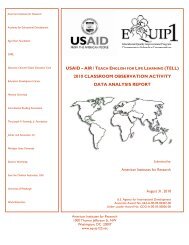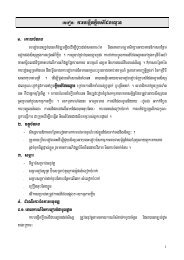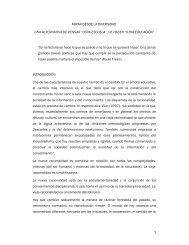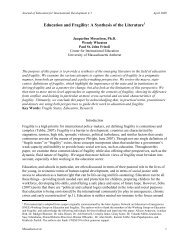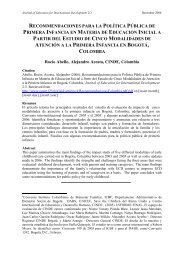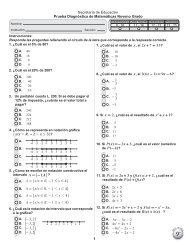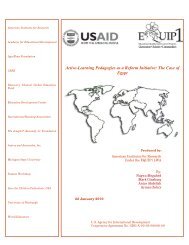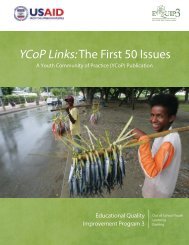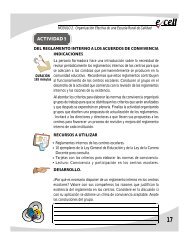The Power of Persistence: Education System ... - EQUIP123.net
The Power of Persistence: Education System ... - EQUIP123.net
The Power of Persistence: Education System ... - EQUIP123.net
Create successful ePaper yourself
Turn your PDF publications into a flip-book with our unique Google optimized e-Paper software.
After more than 50 years <strong>of</strong> development assistance to developing<br />
countries, the rationale and structure <strong>of</strong> international assistance<br />
mechanisms is under intensive critical review. <strong>The</strong> role <strong>of</strong> donors in<br />
coordinating intervention within recipient countries and between one another,<br />
and ownership <strong>of</strong> interventions and accountability for managing support by<br />
recipient countries are under scrutiny as international and bilateral issues.<br />
<strong>The</strong> need for meaningful insight into effective donor support for national<br />
education systems has never been greater.<br />
<strong>The</strong> U.S. bilateral program has undergone significant changes in structure over the<br />
past decade, and is currently under intensive strategic review. <strong>The</strong> technical and<br />
management capacity in USAID, the U.S.’s primary implementing agency, has been<br />
under-resourced for years.<br />
<strong>The</strong> World Bank has been criticized by some recipients as ineffective and heavyhanded;<br />
the Fast-Track Initiative is undergoing an extensive international evaluation,<br />
and major European donors have increasingly moved away from project assistance<br />
to work through pooled funding, Sector Wide Approach (SWAp), and direct budget<br />
support (DBS).<br />
Recent studies <strong>of</strong> donor support to education (World Bank 2006, Chapman<br />
and Quijada, EQUIP2 2008) raise questions about overall program impact and<br />
sustainability, particularly in relation to learning outcomes and education quality.<br />
<strong>The</strong> 2005 Paris Declaration on Aid Effectiveness promotes country-led development,<br />
and focuses on the role <strong>of</strong> recipient nations in managing aid.<br />
In 2008, the High Level Forum on Aid Effectiveness in Ghana raised pointed<br />
critiques <strong>of</strong> aid programs, in particular the inefficiencies and lack <strong>of</strong> coordination<br />
among donors.<br />
To a surprising extent, changes in aid modalities and other issues have not been<br />
well informed by empirical data about what works and does not work — and<br />
why — in particular contexts. A common finding <strong>of</strong> both the World Bank and<br />
EQUIP2 education studies is that too few programs have rigorous evaluations,<br />
particularly in terms <strong>of</strong> the impact on student learning. <strong>The</strong> Evaluation Gap<br />
Working Group has highlighted the lack <strong>of</strong> solid evaluation as a significant<br />
shortcoming in foreign assistance programs.<br />
SECTION 1: INTROdUCTION<br />
13



